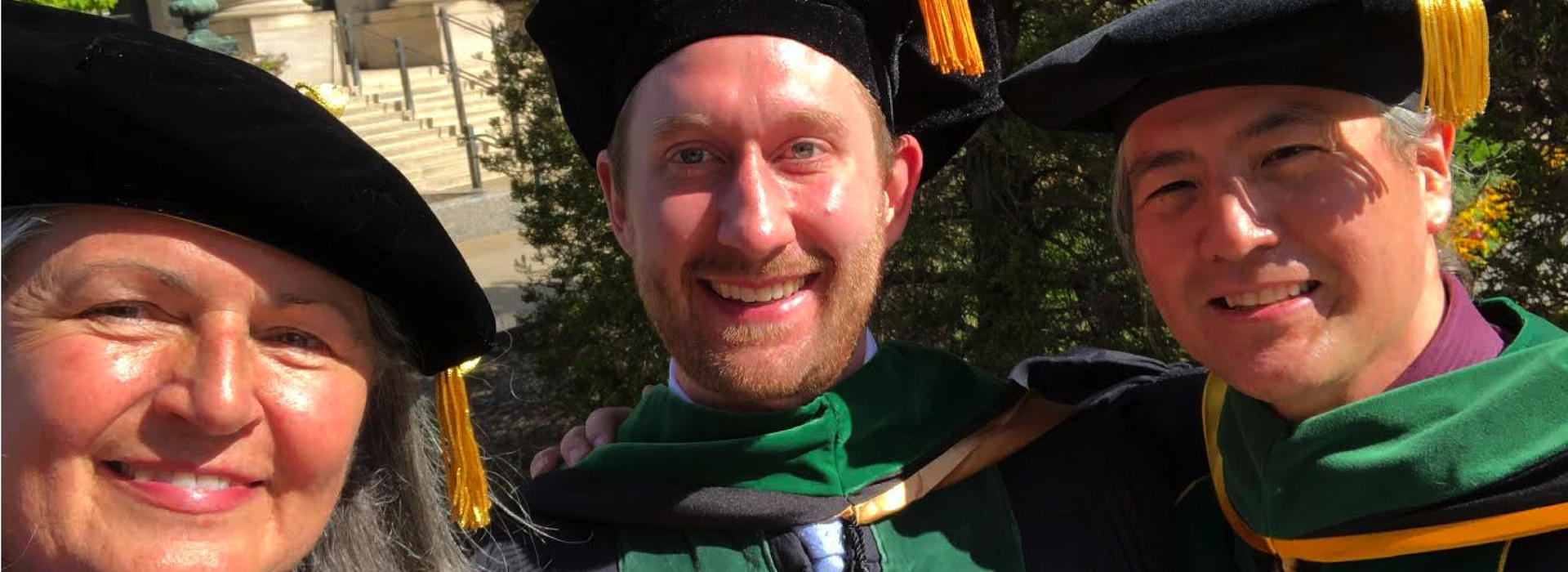
Story Slam Facilitates Conversations about Medical Student Mental Health
In preparation for Step 1 of the United States Medical Licensing Examination, Kyle Pribyl, MD, had studied the symptoms of depression and anxiety using the mnemonic, SIGECAPS, which stands for sleep, interest, guilt, energy, concentration, appetite, psychomotor retardation and suicidality.
“Although I was doing well with those questions, I was unable to diagnose a patient who was oversleeping, not going to class, not eating, steadily losing weight, had unremitting fatigue, felt worthless and questioned the value of life,” said Dr. Pribyl, now a 2021 Medical School graduate, during March’s Story Slam, a Center for the Art of Medicine (CFAM) event. “I missed the diagnosis because that patient was me.”
His spoken-word story, originally presented virtually to that Story Slam audience of about 150, courageously addresses physician and medical student mental illness and earned him a spot in May’s edition of Academic Medicine. Thankfully, Dr. Pribyl sought help and was able to get the treatment needed to begin addressing the illness. Now, he shares his story with the hope of normalizing mental health conversations.
“I just hope it’s another step in the right direction to combat the stigma surrounding mental health,” Dr. Pribyl said.
While students entering medical school typically exhibit the same mental health levels as their peers, some studies suggest that depression and anxiety increase throughout medical training, indicating that the additional rigors of medical school may be one possible explanation for the rise.
“Society often sees doctors as impervious to illness, especially mental illness, because it is assumed that we know better and seek help when necessary,” Dr. Pribyl’s story continued. “That is not true.”
While physician mental health and burnout have been the topic of numerous studies, the stresses often begin accumulating much earlier in medical school. According to the American Medical Association, one in three medical students report symptoms of depression, and one in nine experience suicidal ideation. For Dr. Pribyl, this began toward the end of the first year of medical school, when preparation for licensing exams and relationship stress became overwhelming.
“One of the most difficult things I’ve ever done was tell someone about the way I was feeling and how depressed I was,” Dr. Pribyl recalled. “I honestly didn’t want to continue with medical school anymore; I wanted to quit and drop out.”
While Dr. Pribyl did his best to carry on with his education, combatting an underlying illness was tiring, and on a rotation at the U, his chief resident took notice. She sat him down to talk and reached out to his mentors Robin Michaels, MD, from the Medical School, Duluth Campus, and Michael Kim, MD.
“Dr. Michaels ended up coming to the cities, and we met with Dr. Kim to talk,” Dr. Pribyl said. “I told her everything that was going on, and she said I needed to go to the emergency room.”
This support system, ultimately, helped get him the treatment needed to begin recovering, and after a break from school and quality time with his cousin’s family, Dr. Pribyl was able to return to medical school to resume his rotations.
“I felt behind, but it wasn’t bad,” he said. “I made some good friends through the rotations and was able to persevere and keep going.”
This month, Dr. Pribyl graduated from the Medical School and has matched into the Medical School’s Department of Anesthesiology Residency Program. For his story, he received the Zink Student Narrative Award, presented to a graduating medical student whose narrative is impactful, well-written and ready for publication. He also received several scholarships over his four years, including the Bayley Hedin Scholarship, Ollila Scholarship and Speckman Scholarship.
“Receiving a scholarship meant more than financial security for my family and me,” Dr. Pribyl said. “It meant that people believed in me, and it gave me the motivation to continue to prosper to my highest potential.”
He hopes his story helps others recognize symptoms of mental illness and inspires them to seek help.
“The main message is: Don’t be afraid. You’re not admitting defeat,” Dr. Pribyl said. “Acknowledging that you’re depressed is okay. It’s a disease, and there are chemical imbalances in your brain. It’s okay to seek help.”
For those in need, the U of M has mental health resources available.
This month is Mental Health Month, and the University of Minnesota Foundation started a crowdfunding campaign to support medical student wellbeing. If you would like to support this fund, make a gift here.